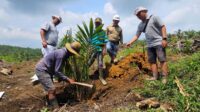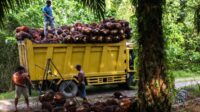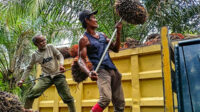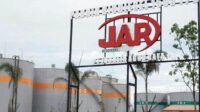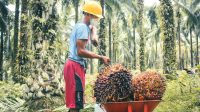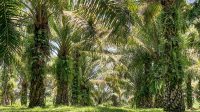PALMOILMAGAZINE, BANDUNG — Despite the genetic potential of hybrid oil palm trees to produce 10–12 tons of crude palm oil (CPO) per hectare annually, actual yields in Indonesia remain far below that mark. Current national production averages only 2.6–4.1 tons per hectare—just 25–30% of its potential. This gap highlights ongoing weaknesses in field management and cultivation practices.
To address this issue, the Faculty of Agriculture at Universitas Padjadjaran (Faperta Unpad) and Etcas Consultant are launching a series of technical training programs aimed at increasing the productivity of Fresh Fruit Bunches (FFB) and improving oil extraction efficiency. The sessions will be held from October to December 2025 at Hotel Horison Ultima Bandung.
“With this training, we aim to help participants adopt best practices in their own plantations. It’s not just about technical skills—this initiative supports the national goal of securing palm oil feedstock for biodiesel and biogasoline,” said the organizers in an official statement to beige-heron-208544.hostingersite.com on Tuesday (8 July 2025).
Also Read:
The training program covers five integrated core topics, ranging from fertilization fundamentals to the latest agronomic innovations.
Five Core Training Topics for Palm Oil Productivity
- Palm Oil Fertilization (3 Days)
Focuses on the correct methods, dosage, timing, and types of fertilizers. Participants will also learn a new mindset: boosting yields in plantation agriculture must follow biological industry principles—it’s a process, not an instant fix. - Designing Basic Fertilizer Recommendations – Phase 1 (4 Days)
Participants will develop practical and cost-effective fertilizer plans while learning how to calculate the economic efficiency point, a key metric in maximizing plantation profits. - Advanced Fertilizer Planning – Phase 2 (5 Days)
This stage teaches how to analyze leaf and soil data to create tailored fertilization strategies. Topics include field inspections, the role of climate, and on-site experimentation to fine-tune fertilization decisions. - Root Zone Management: Agronomic Innovation (3 Days)
One of the course’s standout topics introduces Under Soil Surface Management—a technique to enhance the rhizosphere and stimulate active root growth. When applied correctly, it can potentially boost yields by 30–80%. - Canopy Management (2 Days)
Aims to optimize the plant’s canopy structure for maximum photosynthesis. The course also explores the link between frond number and productivity, and how nutrient deficiency symptoms can serve as plant health indicators.
Commitment to Smallholder Empowerment
EnergyWorld Indonesia and its partners emphasize that the training is designed not only for estate technicians or plantation managers but also for independent smallholders seeking to apply scientific principles to their farms.
“This training bridges academic research with real-world application. It’s about empowering farmers with knowledge to make their plantations more productive and sustainable,” the organizers stated.
Registration is now open via the official registration link. With limited seats and highly applicable topics, the training series is positioned as a strategic opportunity to close the productivity gap between the potential and reality of Indonesia’s oil palm sector. (P2)






